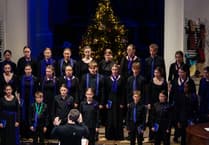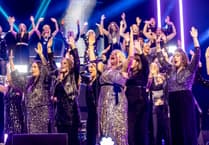The 2025 Haslemere Festival began with an evening devoted to the plays and sonnets of William Shakespeare that have provided the inspiration for the music of a number of composers to represent the characters and drama of his works.
These include Felix Mendelssohn, Sergei Prokofiev, Otto Nicolai, Ernest Chausson, George Shearing, our own Ralph Vaughan Williams and many others. On May 3 the Haslemere Musical Society gave its capacity audience the opportunity to enjoy the Shakespearian music of these composers at Haslemere Hall.
In a wonderful mix of choral and orchestral works with inserted speeches from the plays, the evening was a rollercoaster of musical and dramatic delights. Extracts from the dramas were recited by Fiona Cullis and David Greenwood, members of the Haslemere Thespians. The orchestra and chorus were conducted, as usual, by Dr James Ross.
The evening began with the hugely popular Wedding March from Mendelssohn’s music to A Midsummer Night’s Dream, which was played confidently and with gusto by the orchestra. This was followed by a less well known work, Nicolai’s The Merry Wives Of Windsor Overture. This is a delightful work, allowing the various sections of the orchestra to display their talents.
Not many people know that English born composer and jazz pianist Sir George Shearing also wrote music inspired by Shakespeare’s writings. His Songs and Sonnets, composed in 1999, were enthusiastically sung by the musical society’s choir, accompanied by Clive Osgood at the piano.
The seven songs are Live With Me And Be My Love, When Daffodils Begin To Peer, It Was A Lover And His Lass, Spring, Who Is Sylvia?, Fie On Sinful Fantasy and Feste (Twelfth Night) When That I Was And A Little Tiny Boy. These songs were a special treat and the choir gave them a splendid rendition.
The first half was completed with a resounding performance of the second suite from Prokofiev’s ballet Romeo and Juliet. The opening jaunty, march-like theme of Montagues and Capulets (Dance Of The Knights) with much pomp and power is extremely popular.
The eerie but gentle flute melody of innocence introduces Juliet as a child. This was followed by Friar Lawrence with its delightful bassoon solo before a quick Dance Of The Five Couples featuring an oboe solo. The suite is completed by Romeo At Juliet’s Grave, a tragic musical lament. The wind section of the orchestra was exposed in this music and they were a credit to the orchestra. This was a very fine performance overall.
After the interval, we experienced the highlight of the evening. When one thinks of music for Shakespearian plays and films, it is usually William Walton’s name that comes to the fore. Not so well known is that Ralph Vaughan Williams, an avid fan of Shakespeare, also provided music for the performance of many Shakespeare plays, particularly Richard III and Henry V.
We were treated to My Kingdom For A Horse (Richard III), a spirited movement, as the introduction to the second half of the evening. This was followed by the Overture: Henry V. This was a world premiere of the music reconstructed by David Owen Norris. A French marching song introduced the work and included much music for the wind section. This is a splendid work and should be widely performed in concert.
A piece new to me followed, Ernest Chausson’s air and rustique dance from The Tempest. Composed for the 1888 performance of the play in Paris, it shows his melodic genius and orchestral expertise.
Another work with which I was not familiar was Vaughan Williams’ In Windsor Forest, which includes a series of choruses from his opera Sir John In Love. The movements are The Conspiracy, Drinking Song, Falstaff and the Fairies, Wedding Chorus and Epilogue. The chorus and orchestra gave it their all and it provided a thrilling climax to the evening. In all, this was a very fine concert and thoroughly enjoyed by its audience.
Roger Saunders




.jpeg?width=209&height=140&crop=209:145,smart&quality=75)
Comments
This article has no comments yet. Be the first to leave a comment.